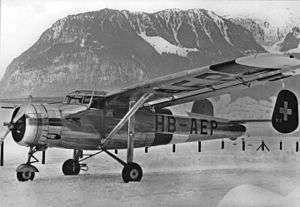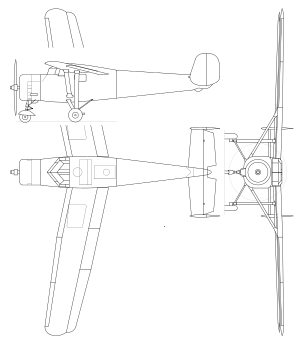Pilatus SB-2
The Pilatus SB-2 Pelican was a civil utility aircraft developed by the newly formed Pilatus Aircraft company and the ETH Zurich during World War II.
| SB-2 Pelican | |
|---|---|
 | |
| Pilatus SB-2 | |
| Role | Four/six-seat light transport |
| National origin | Switzerland |
| Manufacturer | Pilatus Aircraft |
| First flight | 30 May 1944 |
| Number built | 1 |
Design and development
The previous project of a four-seater STOL experimental aircraft under the designation Pilatus SB-1 was not implemented, followed by the SB-2, which was intended for commercial use.[1] Work on the SB-2 Pelican, a special “slow-flying” aircraft, commenced in the winter of 1941.[2] Good short takeoff and landing credentials, plus steep climbing capabilities, were essential attributes of the aircraft flown in the narrow Alpine valleys at that time. The aircraft was designed to carry four to six passengers.[2]
The configuration of the SB-2 was slightly unusual, in that it was provided with tricycle undercarriage (an uncommon feature at the time), and a wing that had a slight forward sweep.[2]
The Pilatus SB-2 also served as the basis for a slightly larger STOL aircraft with a larger cargo and passenger capacity, the Pilatus SB-5. However, the Pilatus SB-5 was never built.[3]
Operational history
The SB-2 made its maiden flight on 30 May 1944.[4] After extensive trials, the only model built went to Alpar AG in Bern. The Pelikan was particularly well suited for passenger operations, but could also be used for aerial photography, survey flights, freight transport and agricultural work.
During an air display on 13 June 1948, the Pelican flipped over because the nosewheel sheared off from an unnoticed transverse fracture. It was damaged beyond repair.
Specifications (SB-2)

Data from Jane's all the World's Aircraft 1947[5]
General characteristics
- Crew: 1/2
- Capacity: up to five passengers
- Length: 6.69 m (21 ft 11 in)
- Wingspan: 15.5 m (50 ft 10 in)
- Height: 3.2 m (10 ft 6 in)
- Wing area: 29 m2 (310 sq ft)
- Empty weight: 1,596 kg (3,519 lb) 4 pax
- Gross weight: 2,095 kg (4,619 lb) 4 pax
- Fuel capacity: 340 l (90 US gal; 75 imp gal) fuel in two wing tanks; 30 l (7.9 US gal; 6.6 imp gal) oil
- Powerplant: 1 × Pratt & Whitney R-985 Wasp Junior TB 9-cyl air-cooled radial piston engine, 330 kW (440 hp) for take-off
- Propellers: 2-bladed Hamilton Standard 2-position variable-pitch propeller
Performance
- Maximum speed: 230 km/h (140 mph, 120 kn) at sea level
- Cruise speed: 201 km/h (125 mph, 109 kn) at sea level (280 hp (210 kW) at 1,950 rpm)
- Minimum level speed:76 km/h (47 mph; 41 kn)
- Range: 805 km (500 mi, 435 nmi)
- Endurance: 4 hours
- Take-off distance: 366 m (1,201 ft) to 15 m (49 ft)
- Landing distance: 220 m (720 ft) from 15 m (49 ft)
- Wing loading: 14.7 kg/m2 (3.0 lb/sq ft) 4 pax
- Power/mass: 6.37 kg/kW (10.5 lb/hp) (four passengers at take-off)
| External images | |
|---|---|
| Pilatus ETH SB-2 Pelican | |
Further reading
- Pilatus SB-2 Pelican Das Schweizer Bergflugzeug 1938–1949, Studienbüro für Spezialflugzeuge, Kuno Gross, ISBN 978-3-7494-3640-8.
References
| Wikimedia Commons has media related to Pilatus SB-2. |
- Pilatus SB-2 Pelican: Das Schweizer Bergflugzeug 1938–1949. Studienbüro für Spezialflugzeuge, Kuno Gross, ISBN 978-3-7494-3640-8.
- Jane's Fighting Aircraft of World War II. Naval & Military Press Ltd. 1994. p. 283. ISBN 9780517679647.
- Pilatus SB-2 Pelican: Das Schweizer Bergflugzeug 1938–1949. Studienbüro für Spezialflugzeuge, Kuno Gross, ISBN 978-3-7494-3640-8.
- Swiss Review of World Affairs Volume 5/6. Neue Zürcher Zeitung. 1955. p. 152.
- Bridgman, Leonard, ed. (1947). Jane's all the World's Aircraft 1947. London: Sampson Low, Marston & Co. p. 172c.